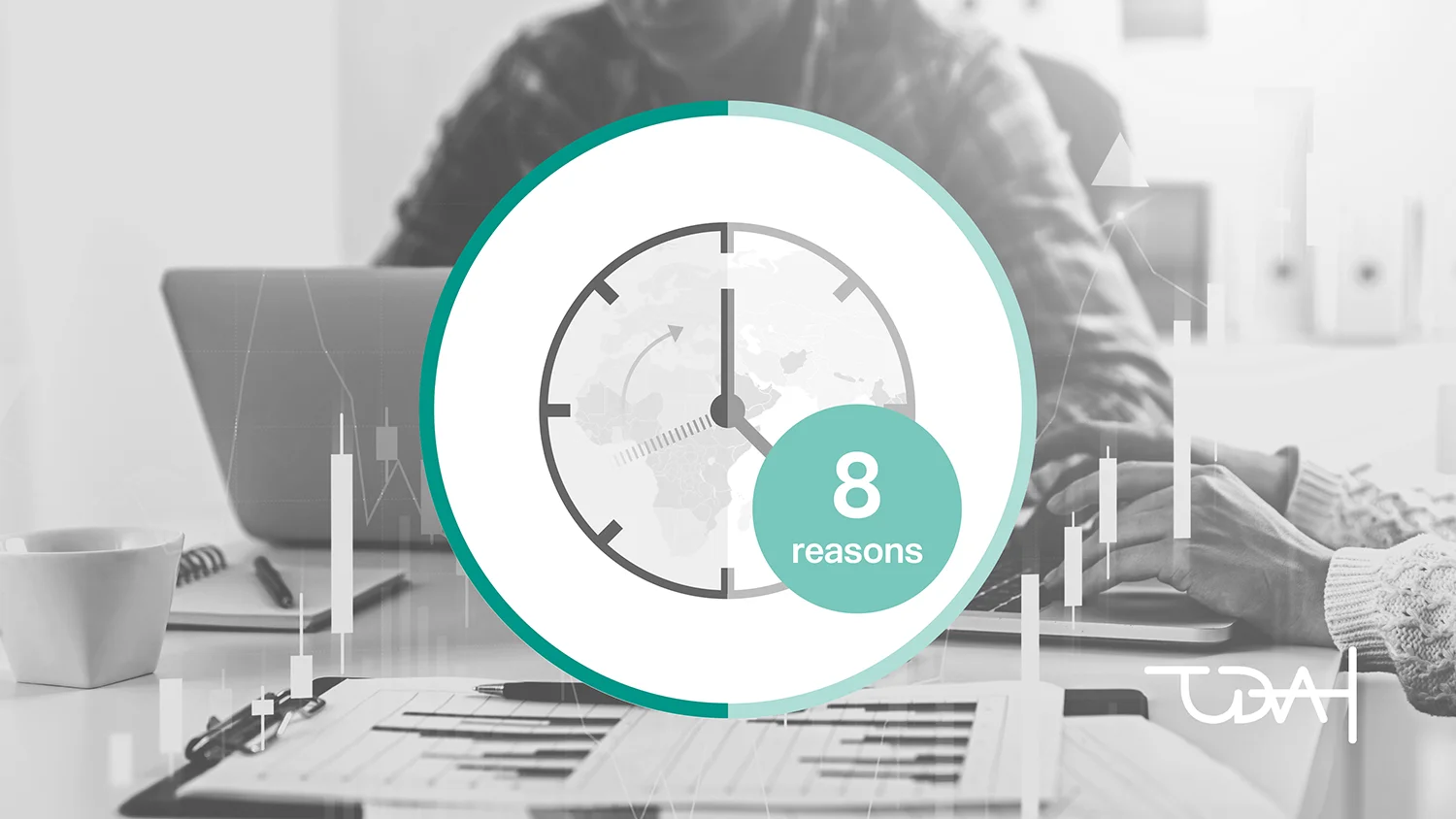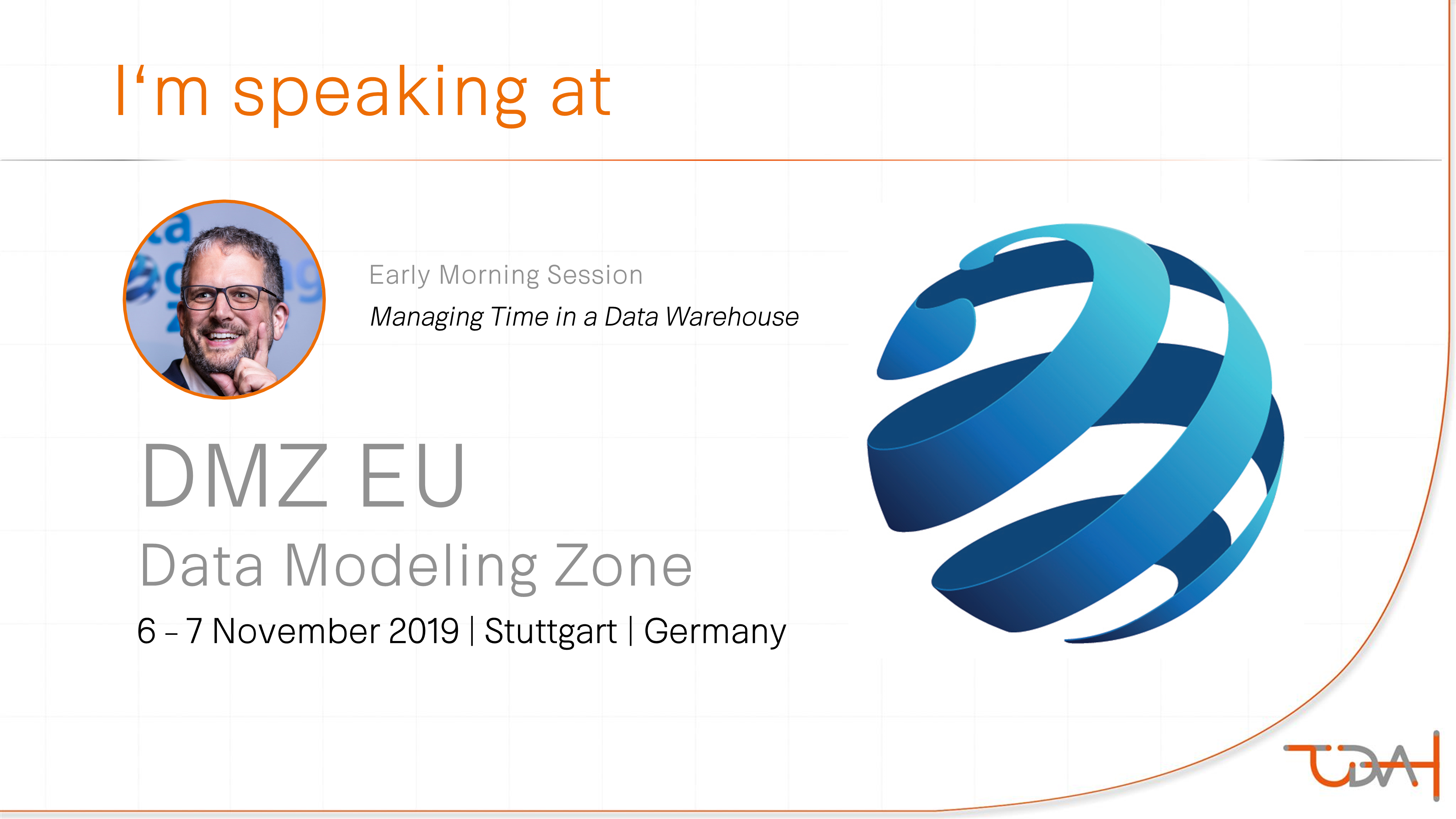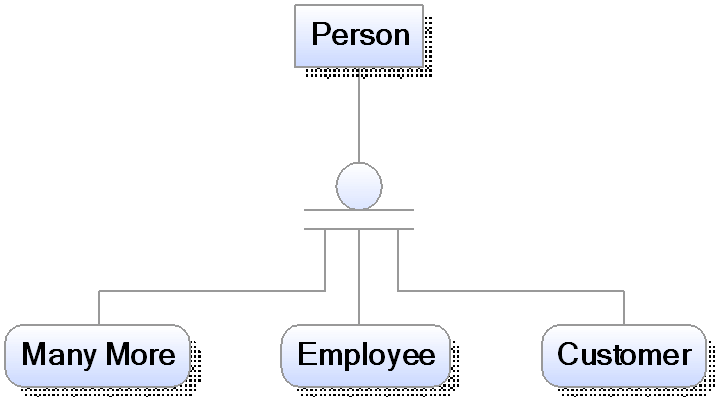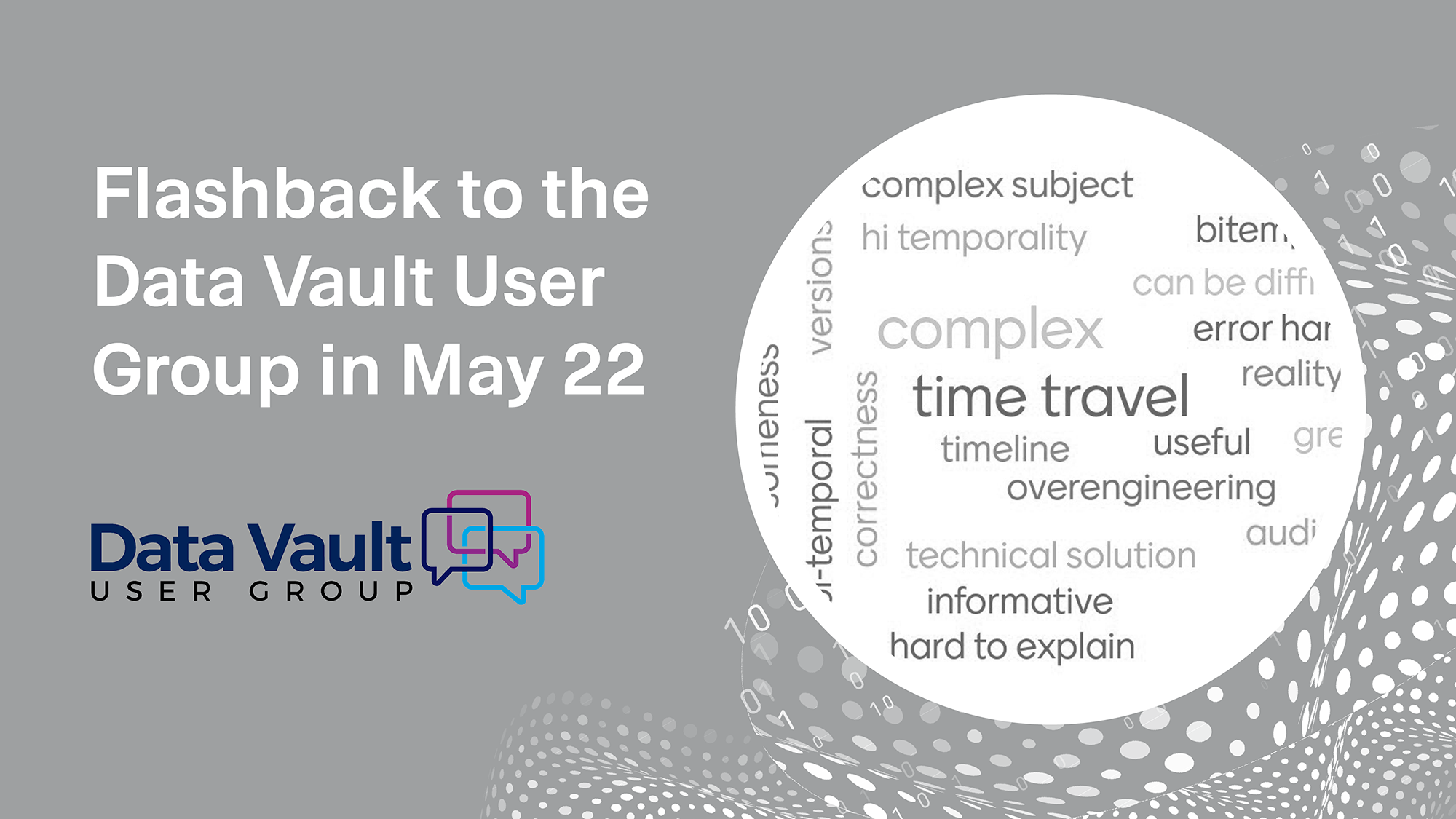Temporal
-
8 Gründe, warum man bitemporale Daten benötigt

Diesmal beschäftigt sich das Team des Data Management Center of Excellence (DMCE) von FastChangeCoTM mit der Frage: Was sind die geschäftlichen Anforderungen an bitemporale Daten?
-
8 reasons why you need bitemporal data

This time, FastChangeCoTM's Data Management Center of Excellence (DMCE) team looks at the question: what are the business requirements for bitemporal data?
-
Academy
With our TEDAMOH Academy we offer various seminars, trainings and workshops to support and develop continuous learning in your daily business.
You can either extend you theoretical knowledge by attending a seminar or work in practically oriented workshops to acquire knowledge by yourself. To train the usage of a new software or method, such as dealing with temporal data, it is best to have a closer look at the training area.
-
Bitemporal Affront

Or the battle announcement of the incoming interface
The BI Center of Competence (CoC) has decided to use bitemporal data storage when setting up a new data warehouse for one of the business units of the fictitious company FastChageCo™.
BI CoC is well advanced in the bitemporal implementation of Data Vault database objects as well as loading patterns. The already connected systems via formally defined incoming interfaces have worked without problems so far.
-
Bitemporal Data
If everything would happen at the same time, there would be no need to store historic data. We, the consumers of data, would know each and everything at the same instant. Beside all the other philosophical impacts, if time wouldn’t exists, is data still necessary?
(Un)fortunately time exists and data architects, data modelers and developers have to deal with it in the world of information technology.
In this category about temporal data I will collect all my blogposts about this fancy topic.
-
Blog
-
Data Modeling Zone EU/US 19 #DMZone

OK, for those of you who just want to grab a promotion code... I'll make it short 😂:
TEDAMOH
As a speaker at both conferences I give you 15% on the DMZ EU and 20% on the DMZ US. You can register here.
For those of you who are also interested in what I'm going to talk about, a few more informations:
-
Data Vault - Datenmodellierung noch notwendig?

Wie bereits in meinem Blogpost Modellierung oder Business Rule beschrieben ist es notwendig sich bei der Datenmodellierung über Geschäftsobjekte, die Wertschöpfungskette, fachliche Details und die Methodik des Modellierens einige Gedanken zu machen.
Oder doch nicht? Kann ich mit Data Vault einfach loslegen? Schließlich ist Data Vault auf den ersten Blick ganz einfach. Drei Objekte: HUBs, LINKs und SAT(elliten), einem einfachen Vorgehensmodell und ein paar wenige Regeln. Brauche ich für Data Vault noch die Datenmodellierung?
-
Data Vault Link Satellites: Use, decision support and examples

And there it was again, the lively discussion about the use of a Data Vault Link Satellite. The argumentation, whether yes or no, went round in circles.
-
Data Vault Link-Satelliten: Einsatz, Entscheidungshilfe und Praxisbeispiel

Da war sie wieder, die lebhafte Diskussion über die Verwendung eines Data Vault Link-Satellite. Die Argumentation, ob ja oder nein, drehte sich im Kreis.
-
Erfolg mit bitemporalem Wissen

Ich hatte gerade bei einem neuen Kunden angefangen und war Teil des Data-Warehouse-Teams, das für den Aufbau des Data Warehouse mit Data Vault verantwortlich war. Wir hatten einen Data Vault-Generator entwickelt. Damals verwendeten wir ein Enddatum für die 'business timeline'. Ich erinnere mich, wie kompliziert es war, die alten Datensätze zu aktualisieren, und wie viel Zeit das den Server kostete. Vor allem, wenn man zwischendurch Datensätze hinzufügen wollte. Zum Beispiel um die Historie aus alten Quellen zu laden.
-
Flashback to the Data Vault User Group in May 22

Last week I had the opportunity to present online at the Data Vault User Group about temporal data: Who, how, what - why bitemporal data? Who does not ask will not be wise!
-
How to choose a timestamp for a Data Vault timeline?

Does the Load Date Timestamp (LDTS) data element in the hub, link, or satellite capture the timestamp of the batch, or rather the transaction timestamp at which the data originated in the operational system?
-
Rückblick auf die Data Vault User Group im Mai 22

Vergangene Woche hatte ich die Möglichkeit online bei der Data Vault User Group über temporale Daten vorzutragen: Who, how, what - why bitemporal data? Who does not ask will not be wise!
-
Secret Spice
-
Success with bitemporal knowledge

At work I just started at a new customer and was part of the data warehouse team, who was assigned the task of building the Data Vault Data Warehouse. We were developing the Data Vault generator. At that point we used an end-date for the business time. I remember the complexity for updating the old records and the time for the server it costs to do this. Especially when you want to add rows in between. To load history, for example, from old sources. The training is led by Dirk in an interactive way.
-
Temporal data series

/ SECRET SPICE - Temporal Data Series
Temporal data - A time travel
In loose order I publish my thoughts and experiences around bitemporal or more general temporal data. For me, this includes not only the properties and peculiarities of temporal data itself, but also the associated structures, loading processes and solutions of various kinds.
In any case, important and not to be neglected are the business requirements that underlie all temporal data. From time to time in this series, I will show technologies and related examples that support temporal data.
Like the already published series on PowerDesigner, this series is for myself a kind of diary, a knowledge base and the 'Secret Spice', in which I record my discoveries and for myself documented tips and tricks around temporal data. I would like to share this with you.
And, as always, you'll meet team members from the Data Management Center of Excellence (DMCE) at my favorite client: FastChangeCoTM!
-
Temporale Daten Serie

/ SECRET SPICE - Temporale Daten Serie
Temporale Daten - Eine Zeitreise
In loser Folge veröffentliche ich meine Gedanken und Erfahrungen rund um bitemporale oder genereller temporalen Daten. Dazu gehört für mich nicht nur die Eigenschaften und Eigenheiten der temporalen Daten an sich, sondern auch die zugehörigen Strukturen, Ladeprozesse und Lösungsansätze unterschiedlichster Art.
Auf jeden Fall wichtig und nicht zu vernachlässigen sind die Geschäftsanforderungen, die allen temporalen Daten zugrunde liegen. Ab und an zeige ich in dieser Serie Technologien und dazu passende Beispiele, die temporale Daten unterstützen.
Wie auch die bereits veröffentliche Serie zum PowerDesigner, ist diese Serie für mich selbst eine Art Tagebuch, eine Wissensbasis und das ‘Secret Spice’, in der ich meine Entdeckungen und meine für mich selbst dokumentierten Tipps und Tricks rund um temporale Daten festhalte. Daran möchte ich euch teilhaben lassen.
Und ihr trefft wie immer auf Team-Mitglieder des Data Management Center of Excellence (DMCE) bei meinem liebsten Kunden: FastChangeCoTM!
-
Video | Temporal data modeling - an expert knowledge

With this training, Dirk and team manage to convey expert knowledge in a fantastic learning atmosphere through their friendly and professional manner.
-
Video | Temporale Datenmodellierung - ein Spezialistenwissen

Dirk und Team schaffen es mit diesem Training, ein Spezialistenwissen, durch ihre sympathische und professionelle Art in einer tollen Lern-Atmosphäre zu transportieren.
